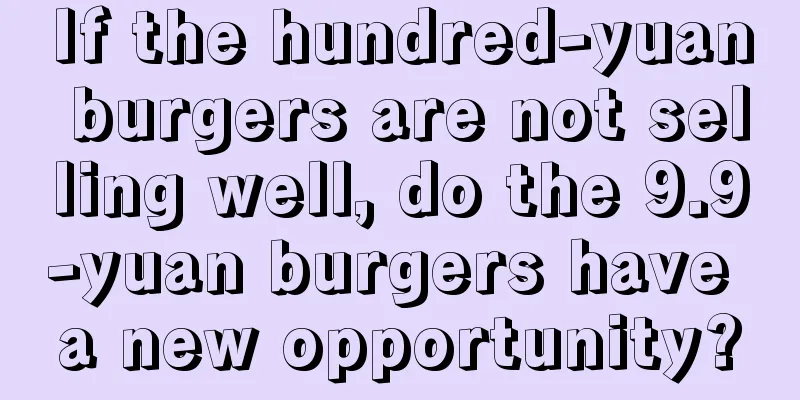An alternative reflection on Zibo barbecue

After the May Day holiday, the streets of Zibo are still crowded with people. Some people lament that Zibo barbecue has been on the hot search list for a long time. As early as more than a week before the holiday, tickets to Zibo from all over the country were sold out and hotels were fully booked. In the context of stimulating consumption in various places, this has indeed made many cities and industries envious. As a result, various analyses, various surveys, and various imitations have been flying like snowflakes, some talking about traffic, some talking about young consumer groups, and some analyzing various effects. But calm down and think about it, have you really learned Zibo barbecue correctly? When countless businesses are trying every means to tap into the "lazy economy", why do young people still travel thousands of miles to eat a bite of Zibo barbecue? Is it just to follow the trend? Apart from Zibo, the barbecue in Jinzhou and Xinjiang is not delicious? The answer is no. The popularity of Zibo barbecue has lasted for a long time and has spread to a wide range, which has long exceeded the normal scope of business and consumption. It is more like the resistance of the younger generation to the sense of refinement and alienated consumption. Zibo is by no means the starting point of this wave, nor will it be its end point. 1. Escape from sophistication and alienated consumptionBefore Zibo barbecue became popular, it went through at least the following stages:
In the first two stages, the popularity of Zibo BBQ on platforms such as Douyin has been relatively stable. On April 8, after superBtai's review video was released, the popularity of Zibo BBQ rose sharply and began to spread to a wider group of people. Notes related to Zibo BBQ also began to appear on platforms such as Xiaohongshu. Many young people were attracted by the honesty of Zibo BBQ. Zibo is a typical old heavy industrial city, and its pillar industries such as chemical industry, electromechanical, papermaking and metallurgy are all labor-intensive industries. Such a third- or fourth-tier small city is a typical half-people society. Modernization and new technologies have reshaped people's lives and brought more convenient services, but people still pay attention to honesty in interpersonal relationships. Not only will they not cheat on the weight of goods, but they will often give some as gifts to acquaintances. Many short videos and notes mentioned that Zibo barbecue is small skewers + small pancakes + green onions. Small pancakes are wrapped with small skewers and green onions. It not only reduces the cost for consumers, but also allows people to eat a full meal for only fifty or sixty yuan per person, and it also tastes less greasy. Compared with the mainstream consumer market, the latter is an alienated consumer market shaped by consumerism. Consumption has gradually deviated from the practical functions of goods and services and is more inclined towards lifestyle, emotional expression, etc.; most brands are thinking about how to increase the average order value through new functions, how to cater to consumption with novelty and fashion, how to find consumers through big data, and how to increase the repurchase rate of products. In the 1950s, economist Ben Agger proposed the concept of alienated consumption, arguing that people's consumption of goods and services is often not what they want, but the result of external stimulation, temptation and discipline. During the economic upswing, people are infected by the lifestyle and optimism advocated by consumerism, and consumption gradually deviates from the practical functions of goods and services and tends to be more about lifestyle and emotional expression. In the catering industry, we see that as the chain becomes longer and the division of labor becomes more detailed, humans are getting further and further away from the original food, and marginal benefits are decreasing. When the economy is in a downturn, people withdraw from excessive refinement and alienated consumption, and gradually return to the practical functions of goods and services. Zibo barbecue has become popular, with the help of new traffic and new groups, but more importantly, it is the change in this social consumption mentality, that is, the younger generation withdraws from the sense of refinement and alienated consumption. Zibo is by no means the starting point of this trend, nor will it be its end point. Not long ago, I saw a short video in which the owner of a lighting company called for lighting companies to not put too many resources on various controllers, but to focus on the research and improvement of the light environment, which is the core competitiveness of lighting companies. 2. A postmodern life is emergingIn the past few years, many businesses have been developing various lazy products, claiming that this is a huge market. But now, young people travel thousands of miles from all over the country to Zibo and grill barbecue by themselves. Zibo barbecue is one of the few cities in China that still retains independent small stove barbecue. When eating barbecue in Zibo, after the diners sit down, the business will first set up a small stove, put red-hot charcoal on it, and then serve the small skewers that are about 70% cooked. Diners can grill it themselves, and when they are satisfied, they can add small cakes, sauces, green onions and small skewers to enjoy. Many products developed for the lazy economy are aimed at more niche scenarios and convenient needs. We have previously written that behind "laziness", there are actually many false demands, with subsidies from large companies and capital. Excessive services and excessive conveniences often end up in a mess after the subsidies are withdrawn, and the corresponding products are also out of touch with the public's needs. (The capital's underwear is exposed! Losses are endless, and false demands are prevalent) Zibo barbecue does not look so refined, and even shows a primitive state, but this is exactly the life that people desire. In the past three years, the epidemic has been unpredictable, and individuals have become self-centered, closed and withdrawn. There is a lack of interaction between people, but humans are naturally social animals that need communication and interaction. Think about the hospitals, prisons and schools described by sociologist Foucault: "When we were locked up, it was a good time, but today, the situation has become worse." As human society has developed to this day, the network is connected, but the meridians are blocked. Humans need to get out of the steel forest, escape from the disciplined life, and return to the world of physical exhaustion, anonymity, dispersion and diversity. Zibo barbecue, like camping, is a kind of postmodern life, which allows people to regain the missing interaction and communication to some extent. Last year, Yibang Power wrote an article pointing out that even during the epidemic, when some people were quarantined at home, they would set up tents in the living room to let their children satisfy their camping addiction. Some senior players even "bought instead of rented", and spent more than 10,000 yuan to buy a full set of equipment in two years. "Every time I was watched, I felt very proud, and the equipment of the people around me was sold out in seconds." (Is camping the only thing that makes money this year? | Yibang Depth) After the epidemic, in addition to camping and Zibo barbecue, more business forms have emerged, such as Frisbee, bicycle riding, etc. The common feature of these business forms is that they allow people to temporarily escape from the "steel forest" of the city and gain a brief relaxation and healing, so they are called the "one-night utopia" of urban white-collar workers. Compared to Zibo barbecue, camping is another way to escape from disciplined life. For example, in our article in 2022, we mentioned: In Pinggu, Beijing, young people took advantage of this wave to flock to the lakeside campsite and enjoy a night of utopia. In the evening, as the lights gradually increased, the earth quietly merged into the warm night. Under the rare starry sky in the city, people sang, danced, or quietly enjoyed the breeze. 3. Alienated Consumption and Made in GermanyAgger once opposed alienated consumption, believing it to be a negative impact in commercial society, and proposed some methods to combat alienated consumption. He said consumers should buy goods and services more rationally, understand their quality, price and purpose; consumers should organize themselves to convey their needs and business to the business community. The popularity of Zibo barbecue is more like the younger generation's resistance to sophistication and alienated consumption. Behind it is the call from consumers against alienated consumption during the economic downturn. In fact, similar alienated consumption phenomena have already occurred in developed countries. For example, in Japan, the art of storage was once very popular and highly praised, and countless people followed suit. But soon, people found that "over-storage" would only make life more and more tiring. Excessive storage may lead to an excess of storage designs and storage tools. The more storage compartments and cabinets the better. Wardrobes, cupboards, shoe cabinets, balcony cabinets, tatami mats, and even sofas and beds should have storage compartments. However, the increasing storage space limits the convenience of life and may also give rise to problems such as inconvenient storage and access, airtightness and easy moisture, inability to move, and dripping window glass in winter. In China, small appliance companies are innovating in segmented scenarios and launching a variety of internet-famous kitchen appliances, including air fryers, blenders, food processors, multi-function pots... Most of these products focus on scenario innovation and design innovation, but many product descriptions may be false needs. Another example is egg cookers. Many small appliance companies have developed egg cookers for different scenarios, such as boiling eggs in bed or on the road. In fact, if you look at any German kitchenware company, such as WMF, there are only three egg cookers, but they are all sold to the global market. Another example is Flexi, which specializes in the production of retractable pet leashes. Although it does not have many product lines, it accounts for 70% of the global market share and is almost the first choice for many retractable leashes. On social media, a user said that he has had his oldest Teddy for almost 4 years, and he has used Flexi's leashes for more than three years, and they are still working well. But German manufacturing was not like this from the beginning. From 1870 to the early 20th century, "Made in Germany" was low-quality and cheap, and the golden signboard of the global manufacturing industry at that time was Britain. In order to distinguish itself from German manufacturing, Britain required that all goods must be marked with the country of origin. In the years that followed, Germany invested in research and development and continuously improved its products. The secret of German-style innovation is to make the company's technology very strong in a very narrow professional field. Even in a very small sector, it can become a market leader. After 40 years of rapid development, our alienated consumption has gone too far and too fast, and we have forgotten why we started. There is no doubt that the surge behind the popularity of Zibo barbecue is a trend of reflection. If anyone wants to imitate and learn, they should first pay attention to the changes in consumption patterns. Author: Dong Jinpeng Original title: This is the driving force behind the explosion of Zibo barbecue Source public account: Yibang Power (ID: iebrun), eliminating all e-commerce knowledge gaps. |
<<: What is the difficulty in marketing functional products?
>>: When an ordinary person is selected by traffic
Recommend
How to access Facebook in China? Is it legal to access Facebook in China?
Facebook has attracted much attention due to its r...
Super practical consumer psychology from an e-commerce boss, increasing conversion rate by 100%!
This article uses the user's complete shopping...
Can the materials before Shopee's re-entry still be used? What are the requirements?
To open a store on Shopee, you need to submit a se...
MINISO, addicted to collaborations, has turned itself into a "toy store"
As the retail industry continues to change, MINISO...
To monetize traffic, Xiaohongshu and Douyin compete for offline merchants
This year, Internet companies in different fields ...
The 35 trillion local market is hot: customers come from Kuaishou, and goods come from Meituan
What will local life be like in 2024? The answer l...
How to optimize Amazon's automatic advertising if it doesn't work well? What is the automatic advertising optimization plan?
Amazon automatic advertising is an important means...
Does Amazon require a security deposit? How much capital is needed to do business on Amazon?
As the Amazon platform continues to grow, more and...
How can I change my email address for Shopee? What should I pay attention to when submitting for review?
Some friends have started preparing relevant infor...
What are the consequences of cross-border e-commerce infringement? How to avoid infringement?
With the advancement of globalization and the rapi...
What is the first step after opening a store on Shopee Indonesia? How did Shopee Indonesia start?
Opening a Shopee store in Indonesia is a promising...
How to operate TOB community? Do you have the answer? 1.0
This article mainly introduces how to operate a TO...
Where do products come from for Shopee? What are the supply channels?
There are many cross-border e-commerce platforms, ...
In 2022, 20 vertical anchors will "make money quietly", and 3 "new super heads" will rise
In the past year, live streaming e-commerce has un...
Xiaohongshu now supports traffic-generating mini-programs
Xiaohongshu is accelerating its commercialization ...









